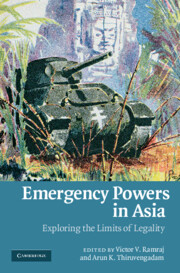Book contents
- Frontmatter
- Contents
- List of contributors
- Preface
- 1 Introduction: emergency powers and constitutionalism in Asia
- PART I Perspectives from legal and political theory
- PART II Postcolonial and post-conflict transitions
- PART III Emergencies, executive power and constitutional order
- 10 Emergency powers and the rule of law in Indonesia
- 11 Emergency powers with a moustache: special powers, military rule and evolving constitutionalism in Thailand
- 12 Emergency powers and the limits of constitutionalism in Japan
- 13 States of exception in an exceptional state: emergency powers law in China
- PART IV The role of the courts
- Index
- References
12 - Emergency powers and the limits of constitutionalism in Japan
from PART III - Emergencies, executive power and constitutional order
Published online by Cambridge University Press: 04 August 2010
- Frontmatter
- Contents
- List of contributors
- Preface
- 1 Introduction: emergency powers and constitutionalism in Asia
- PART I Perspectives from legal and political theory
- PART II Postcolonial and post-conflict transitions
- PART III Emergencies, executive power and constitutional order
- 10 Emergency powers and the rule of law in Indonesia
- 11 Emergency powers with a moustache: special powers, military rule and evolving constitutionalism in Thailand
- 12 Emergency powers and the limits of constitutionalism in Japan
- 13 States of exception in an exceptional state: emergency powers law in China
- PART IV The role of the courts
- Index
- References
Summary
Introduction
If emergency powers are conceptualised as involving the partial suspension of the rule of law for reasons of necessity (political or otherwise), and the principal justification for such action is the long-term preservation of the legal order and various basic liberties underlying that order, then the so-called Northeast Asian developmental state, of which Japan is a prominent example, poses something of a conundrum. After all, a recurring feature of developmental state discourse has been the contention that the law has, at least historically speaking, played a limited role in regulating political and social life, and that the rule of law has not yet fully emerged. It has often been suggested that the primary function of law within such states has been to bolster the position of the executive and to insulate, often ‘extra-legal’, administrative action from judicial scrutiny. This has been achieved by curtailing judicial independence and the scope of human rights, and has resulted in a greatly diminished zone of legality compared to other jurisdictions with comparable levels of economic development.
In the absence of a strong rule of law and human rights tradition one might conclude that the crucial elements that allow us to distinguish, in an analytically precise way, between a ‘normal’ and an ‘emergency’ situation are absent. This, in turn, casts some doubt on the necessity of constitutional or legislative provision for emergency powers or a ‘state’ of emergency. In the absence of substantive legal constraints on executive action, why legislate for their suspension?
- Type
- Chapter
- Information
- Emergency Powers in AsiaExploring the Limits of Legality, pp. 314 - 341Publisher: Cambridge University PressPrint publication year: 2009

